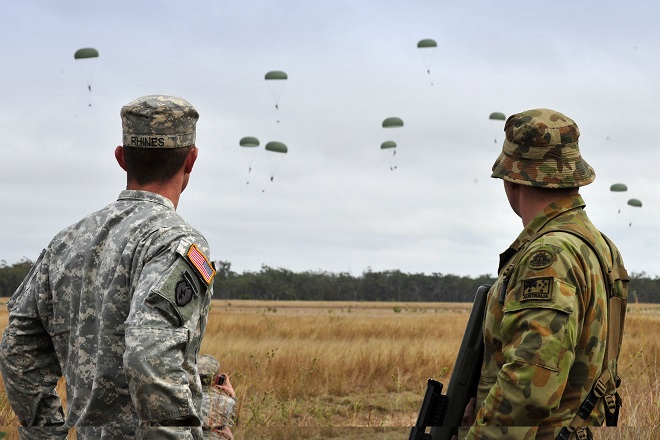Expanding alliance: ANZUS cooperation and Asia-Pacific security
Posted By Peter Jennings, Andrew Davies, Benjamin Schreer and Daniel Nichola on December 2, 2014 @ 06:00
 [1]
[1]Nearing a sprightly 65 years of age, the alliance between Australia and the US, underpinned by the formal ANZUS Treaty of 1951, continues to be a central part of Australian defence and security thinking and an instrument of American policy in the Asia–Pacific. But Asia’s strategic outlook has changed almost unrecognisably from the 1950s to today. Economic and financial systems, the sources of global wealth and power, military and communications technology and even the political structures of Asia–Pacific countries have all transformed dramatically since the end of World War II.
How is it that an alliance conceived as a bulwark against a resurgence of Japanese militarism and which cut its military and intelligence teeth in the Cold War is still relevant to today’s strategic concerns? The answer is partly— and importantly—that the core values of the ANZUS members are strongly aligned, and successive Australian governments and American presidential administrations have seen great value in working with like-minded partners to ensure Asia–Pacific security. That’s seen ANZUS adapt to strategic change several times during its existence. Far from becoming a historical curiosity, today it’s not just relevant, but of greater importance than has been the case in the past few decades. Everything old is new again in the ‘Asian century’.
Two events in the first decade of this century have propelled ANZUS back into the mainstream of security policy development. The first and most dramatic was the 9/11 attacks, after which Prime Minister Howard formally invoked the ANZUS Treaty for the first time. Consistent with Article IV, Australia and the US acted to meet the common danger posed by al-Qaeda. Less dramatic, but potentially more significant in the long run, is the shift in emphasis in American policy towards Asia under its ‘pivot’ or ‘rebalance’.
This was reinforced at the August 2014 Australia–US Ministerial (AUSMIN) Meeting [2], where a new legally binding agreement on force posture cooperation was signed to support US Marine Corps and Air Force activities in northern Australia. The same meeting endorsed closer cooperation on ballistic missile defence, industry collaboration, science and technology research, defence exercises and space cooperation. The alliance was lauded by the Australian foreign and defence ministers and the US secretaries of state and defence as providing new ways to ‘partner with other countries in the region’. The role of ANZUS as a vehicle for engaging Asia–Pacific countries, and ASEAN states in particular, is a new aspect of alliance cooperation.
The alliance receives strong bipartisan support from Australia’s major political parties. Only a small number of minor party members or independents in the Australian Parliament express outright opposition to it. It was a Labor government under Julia Gillard that promoted so-called enhanced force posture cooperation with the US military in northern Australia in November 2011. Labor’s 2013 Defence White Paper [3] (PDF) said that ‘Australia’s Alliance with the US is our most important defence relationship and is recognised in Australia’s National Security Strategy as a pillar of Australia’s strategic and security arrangements’. Opinion polls show high levels of Australian popular support for the relationship. A longstanding opinion survey [4] conducted by the Australian National University found that 81% of those surveyed in May 2014 thought that ANZUS was ‘very important’ or ‘fairly important’ for Australia’s security.
While the alliance looms larger in Australian political life than it does in the US, there’s no doubting American political support for the relationship. President Barack Obama told the Australian Parliament in November 2011 [5]: ‘As it has been to our past, our alliance continues to be indispensable to our future’.
To explore new ideas on how to strengthen the US–Australia alliance, today ASPI released its latest Strategy—Expanding alliance: ANZUS cooperation and Asia-Pacific security [6] (PDF). The report offers practical ways for the US and Australia to enhance cooperation in the maritime, land, air, cyber, space and intelligence domains and improve alliance burden-sharing and force interoperability.
The alliance between the US and Australia promotes regional and global security while advancing both countries’ strategic interests. In light of the changing military balance in the Western Pacific, it makes sense for Australia to pursue new areas of cooperation with its US ally—and to strengthen existing areas of alliance cooperation—to support the regional position of the US. In a more contested security environment, Australia becomes more important as a capable US ally strategically located close to the intersection between the Indian Ocean and maritime Southeast Asia. And as strategic, economic and political circumstances bring fresh challenges to both countries, alliance cooperation will only increase in importance.
Peter Jennings [7], Andrew Davies [8], Benjamin Schreer [9] and Daniel Nichola [10] are co-authors of ASPI’s latest Strategy—Expanding alliance: ANZUS cooperation and Asia-Pacific security [6] (PDF). Image courtesy of Department of Defence [11].
Article printed from The Strategist: https://www.aspistrategist.org.au
URL to article: https://www.aspistrategist.org.au/expanding-alliance-anzus-cooperation-and-asia-pacific-security/
URLs in this post:
[1] Image: http://www.aspistrategist.org.au/wp-content/uploads/2014/12/Talisman-Sabre-2011.jpg
[2] August 2014 Australia–US Ministerial (AUSMIN) Meeting: https://www.dfat.gov.au/geo/us/ausmin/ausmin14-joint-communique.html
[3] Labor’s 2013 Defence White Paper: http://www.defence.gov.au/whitepaper/2013/docs/WP_2013_web.pdf
[4] A longstanding opinion survey: http://politicsir.cass.anu.edu.au/sites/default/files/ANUpoll_Foreign_policy.pdf
[5] told the Australian Parliament in November 2011: http://www.whitehouse.gov/the-press-office/2011/11/17/remarks-president-obama-australian-parliament
[6] Expanding alliance: ANZUS cooperation and Asia-Pacific security: https://www.aspi.org.au/publications/expanding-alliance-anzus-cooperation-and-asiapacific-security/Strategy_ANZUS_cooperation.pdf
[7] Peter Jennings: https://www.aspi.org.au/about-aspi/aspi-staff/executive/peter-jennings
[8] Andrew Davies: https://www.aspi.org.au/about-aspi/aspi-staff/senior-analysts/andrew-davies
[9] Benjamin Schreer: https://www.aspi.org.au/about-aspi/aspi-staff/senior-analysts/benjamin-schreer
[10] Daniel Nichola: https://www.aspi.org.au/about-aspi/aspi-staff/interns/daniel-nichola
[11] Department of Defence: http://images.defence.gov.au/20110717adf8178707_0070.jpg
Click here to print.